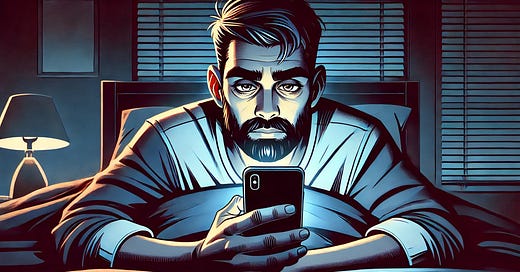Are you addicted to 11 PM freedom?
Why late nights feel so good (and what it's really costing you)
💡 In today's edition:
The Evolution: From "I'm Not a Morning Person" to Consistent Sleep
The Device Addiction We're All Fighting (And How to Win)
Why Your Evening Routine Matters More Than Your Morning One
Consistent sleep was an afterthought. I was that person who'd say "I'm a night owl" and truly believed it. I loved staying up late because it felt liberating - that sense of autonomy over my time, the quiet of the night, no one expecting anything from me.
What I've learned, both from my own journey and from countless patient conversations, is that our scattered sleep schedules aren't just about discipline - they're about how we frame the entire concept of sleep and evening routines. In this edition, I'm going to share how my perspective evolved and, more importantly, the practical systems that finally helped me (and my patients) develop a consistent sleep schedule that doesn't feel like a chore.
The Real Reason Your Sleep Schedule Is All Over The Place
Here's something I've noticed after years of working with patients (and experiencing it myself) - when we blame our scattered sleep on being a "night owl" or having too busy a schedule, we're missing the biggest disruptor: our devices.
I see it with every single patient. The same pattern, the same objections.
"But I need my phone - it's my alarm!" (I'll tell you why that's making things worse). Or we tell ourselves we're just "catching up on things" at night. But what's happening is what researchers now call "revenge bedtime procrastination."
Think about it - during the day, you're expected to be here at this time, there at that time. But at 11 PM? No one's expecting anything from you. Finally, some control over your time! I get it - I used to love that feeling. That's why staying up late feels so liberating.
But here's what's happening in your brain and body:
You're fighting your body's natural sleep signals because you're staring at a bright screen
The endless scroll of content keeps triggering little hits of dopamine, making it harder to stop
You're not really in control - the device is controlling you
The next morning, you feel tired, so you tell yourself "I'm just not a morning person"
And the cycle continues.
Transform Your Sleep With These Simple Shifts
Remember what I said about starting with small changes that make a big impact? Here's what Stanford researcher B.J. Fogg calls a "golden behavior" - something that's incredibly easy to do but has massive impact: Move your phone charger to another room. That's it. Takes 30 seconds and changes everything.
But let's go deeper. Here's the exact system I use (and recommend to my patients) to build a sleep schedule that sticks:
Give Your Phone a Bedtime First
Set a hard cutoff for your phone (mine is 8 PM)
Use an app blocker like Opal to make it stick (and don't be shy about paying for full blocking - how much do you value your time and health?)
The screen goes black and white at 8 PM
From 8:00-8:30, I have a window for final checks
After 8:30, everything gets blocked
Work Backward from Your Ideal Morning
Ask yourself: "What would I like to feel like when I wake up?"
How much time do you need in the morning to not feel rushed?
Count backwards 7.5-8 hours from when you need to wake up
That's your target bedtime - mine is typically 10:00-10:30
Create Consistency (Without Feeling Like a Kid)
You don't need a complicated evening routine
But you do need a bedtime - yes, adults need bedtimes too
The key is similar times each night (even weekends)
I keep my weekend bedtime within an hour of weekday time
Why? Varying it too much makes Monday mornings brutal
Here's what makes this different from other sleep advice: We're not starting with your morning wake-up time. We're not telling you to take a warm bath or drink chamomile tea. We're starting with the biggest disruptor (your phone) and working backwards from how you want to feel.
Remember: You can't have a morning routine until you have an evening routine. And you can't have an evening routine if your phone is controlling your nights.
The best part? Unlike fancy sleep gadgets or supplements, this costs nothing. And once you establish this rhythm, you might find yourself naturally waking up before your alarm - feeling actually rested. Imagine that.
P.S.: The Ripple Effect of Better Sleep
Here's what I've witnessed repeatedly with my patients (and experienced myself): fixing your sleep schedule becomes the catalyst for transforming other areas of your health. Those hours you used to spend scrolling at night? They become your morning workout time. Consistent sleep is the foundation that propels you to make better food choices and prioritize emotional health. Most importantly, it gives you that precious alone time to take care of yourself - so you can show up fully in your personal and professional life.
Until next time…
Live well and RAK ON, Dr. Rak 👊🏽





